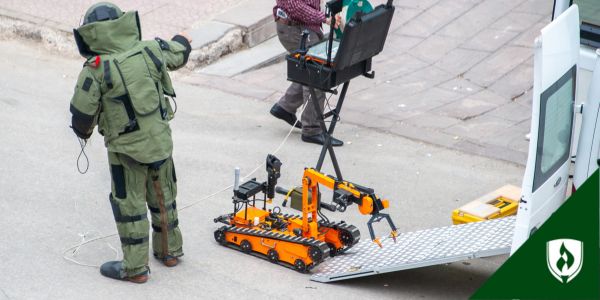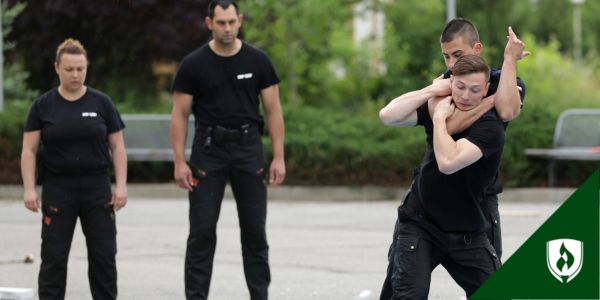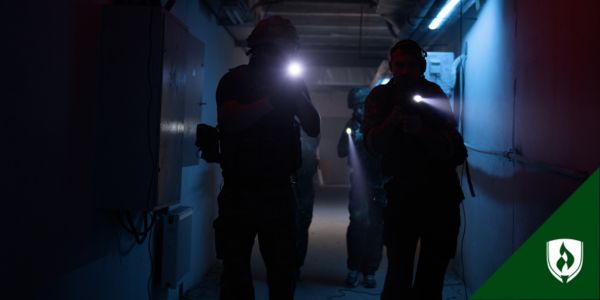
Law enforcement careers can take many forms—there are a lot of professionals who dedicate their careers to protecting communities.
But, what are these job titles specifically? What do their typical duties consist of? What makes each area of law enforcement special? Keep reading to find out!
6 Common types of law enforcement professionals
Law enforcement and public safety go hand-in-hand. Throughout history, laws—and law enforcement careers—have continued to grow in number and scope. These six professions represent a primary subsect of the law enforcement field.
1. Police officer
When you think about “law enforcement jobs,” police officers are probably the first professionals to enter your mind. After all, they’re among the most visible type of law enforcement officer.
You see them on their regular patrols whenever you’re out and about. You may even have been pulled over by patrol officers here and there. Or you turn on the TV to find a barrage of programs with cop characters (and, sometimes, real cops).
Local law enforcement officers routinely patrol their assigned locales, in addition to responding to both emergency and non-emergency calls.1 Essentially, this means a police officer needs to know how to navigate just about any situation concerning public safety. That includes everything from traffic violations to automotive accidents, violent crime, petit theft, illegal drugs—and the list goes on.
Local police officers typically enforce state and local laws, but do not necessarily have the authority to enforce federal law (rather, federal agencies have the power to enforce/investigate federal crimes).
The Bureau of Labor Statistics (BLS) reports that many detectives begin their careers as police officers. Alternatively, a police officer could eventually be promoted to a corporal, sergeant, lieutenant or captain position down the road. These promotions, the BLS states, “usually are made according to scores on a written examination and on-the-job performance.”2
If you see yourself pursuing a career in local law enforcement, make sure to bookmark our article, “How to Become a Police Officer: Your Step-by-Step Guide.”4
2. State trooper
A state trooper is a state police officer (as opposed to local municipality). Unlike local police officers, state troopers’ jurisdiction includes their entire state, rather than a single city or county.
You might associate these professionals with highway patrol, and, while that’s often part of their job, state troopers also have other duties you may be less familiar with. For example, these are just some additional responsibilities troopers share within the State of Minnesota:
- Investigate and reconstruct serious crashes
- Perform flight patrols
- Conduct search and rescue operations
- Investigate vehicle crimes
- Support state homeland security efforts3
Minnesota state troopers also “provide assistance, education and enforcement to state citizens and provide for safe, efficient movement of traffic on Minnesota’s roadways.”3 And, of course, troopers lend assistance to local and/or federal law enforcement agencies, as needed.
Head over to our article, “How to Become a State Trooper,” if this sounds like the right career path for you!4
3. Conservation officer
Conservation officers—sometimes referred to as, “game wardens,” or “fish and game wardens”—serve as state-level law enforcement officers. Like a state trooper, a conservation officer has jurisdiction throughout the entire state in which the officer is employed.
While conservation officers’ duties may vary somewhat from one state to another, in general, these uniformed officers work to protect natural resources. This includes everything from plant and animal wildlife to public lands and waterways.
Conservation officers help ensure hunters and fishers comply with regulations designed to help preserve natural ecosystems. They may also assist people in need and provide emergency response services in rural areas. Additionally, conservation officers may enforce boating laws and other regulations specific to outdoor recreational activities, such as off-roading.
In fact, conservation officers have the power to enforce all state laws. So, you can think of them as state police officers focused on—but not limited to—protecting the environment.
If you’re interested in law enforcement jobs and have a soft spot for the wilderness, then this role is certainly worth looking into. To learn more, read through our article, “What Does a Conservation Officer Do, And How Can You Become One?”4
4. Alcohol law enforcement agent
An alcohol law enforcement agent is another type of state police officer who has jurisdiction anywhere within state lines. As you might suspect, the specific duties associated with this role will vary depending on the state in which an agent is employed.
Some states even use different titles to refer to these professionals. For instance, Arkansas employs “Alcoholic Beverage Control (ABC) enforcement officers.”5
Nevertheless, these agents’ main goal is to ensure the sale and consumption of alcoholic beverages complies with state regulations. This can sometimes mean these professionals work as undercover, “plainclothes” officers, as is the case in Delaware. There, interestingly, these officers also enforce tobacco regulations.6
This line of work can be especially fulfilling if you want a career that allows you to protect the health and safety of others—especially teenagers.4
5. Deputy sheriff
Deputy sheriffs serve under their counties’ elected sheriffs and share many of the same powers and duties as local police officers. Both wear uniforms and conduct patrols to maintain public safety. But while most local police officers only have jurisdiction within the limits of their cities, deputy sheriffs are county-level law enforcement officers, which means their jurisdiction covers the entirety of the counties in which they work.
There are some additional key differences between police officers and deputy sheriffs, as well. For example, deputy sheriffs are also more heavily involved with court systems and county jails than the average police officer.
To further illustrate what makes this role unique, below are the main responsibilities of Lake County, Minnesota deputy sheriffs, as state on the county’s website:
- Responding to requests for assistance from the public
- Preventing traffic accidents and deterring violators
- Investigating accidents and criminal incidents
- Writing incident reports
- Ensuring security and order of the court
- Receiving, processing, recording, storing, maintaining and releasing evidence
- Protecting crime scenes7
Want more information about this career choice? Check out our article, “Patrol Officer vs. Sheriff's Deputy vs. Correctional Officer: Which Law Enforcement Job is Right for You?”4
6. Security officer
Though not technically law enforcement officers, security officers provide civilians with an added layer of safety. Their specific responsibilities can vary depending on their employers. Still, most security officers either conduct patrols or remain at a fixed post where they can be on the lookout for potential threats.
According to the BLS, security guards are required to contact police, fire or ambulance services in an emergency.8 They’ll typically monitor alarms and/or video surveillance systems. Some security guards, though not all, may be armed, and this largely depends on where they’re employed.
Security officers may work in office buildings or factories, for example, where they may “check the credentials of people and vehicles entering and leaving the premises,” per the BLS. Alternatively, they may work in retail stores to “protect people, merchandise, money, and equipment.”8
Below are the largest employers of security guards, as of 2022:
- Investigation, guard and armored car services
- State, local and private educational services
- Healthcare and social assistance
- Accommodation and food services
- Government9
If you like helping others and want a career in the private sector, then a role as a security officer might be a suitable fit.4
Are you considering a future in law enforcement?
Law enforcement is an essential component of the U.S. criminal justice system. From local police to state-level agencies, law enforcement professionals represent some of the strongest and bravest individuals in our society.
Are you ready to join them in their mission to serve and protect others?
Rasmussen University offers a Law Enforcement Associate’s Degree that can be finished in as few as 18 months.10 Now that you know the basics of six fulfilling law enforcement careers, where will your future take you?
1Bureau of Labor Statistics, U.S. Department of Labor, Occupational Outlook Handbook, Police and Detectives, (accessed June 7, 2024), https://www.bls.gov/ooh/protective-service/police-and-detectives.htm#tab-2
2Bureau of Labor Statistics, U.S. Department of Labor, Occupational Outlook Handbook, Police and Detectives, (accessed June 7, 2024), https://www.bls.gov/ooh/protective-service/police-and-detectives.htm#tab-4
3Rasmussen University’s Law Enforcement Academic Certificate and Law Enforcement Associate’s degree programs meet the educational standards established by the Minnesota Peace Officer Standards and Training Board (MN POST). Rasmussen University’s Law Enforcement Academic Certificate and Law Enforcement Associate’s degree program are not aligned to the standards of any professional licensing body other than the MN POST and are not intended to satisfy professional licensure requirements of any professional licensing agency in any other state. It is important to check the licensing requirements in the state in which you wish to seek employment”
4Arkansas Department of Transformation and Shared Services, DFA ABC Enforcement Officer Job Details, (accessed June 10, 2024), https://www.transform.ar.gov/job_class_codes/dfa-abc-enforcement-officer/
5Department of Safety & Homeland Security, State of Delaware, Division of Alcohol & Tobacco Enforcement, (accessed June 10, 2024), https://date.delaware.gov/ATE/index.shtml
6Minnesota Lake County, Deputy Sheriff, (accessed June 11, 2024), https://www.co.lake.mn.us/wp-content/uploads/2023/04/Deputy-Sheriff.pdf
7Bureau of Labor Statistics, U.S. Department of Labor, Occupational Outlook Handbook, Security Guards and Gambling Surveillance Officers, (accessed June 11, 2024), https://www.bls.gov/ooh/protective-service/security-guards.htm#tab-2
8Bureau of Labor Statistics, U.S. Department of Labor, Occupational Outlook Handbook, Security Guards and Gambling Surveillance Officers, (accessed June 11, 2024), https://www.bls.gov/ooh/protective-service/security-guards.htm#tab-3
9Completion time is dependent on transfer credits accepted and the number of courses completed each term.




